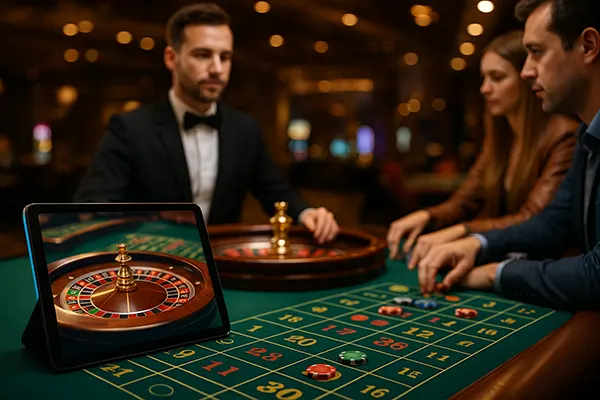The Evolution of Table Games in the Digital Era: How Roulette and Blackjack Transformed Online

Over the past two decades, roulette and blackjack have undergone a remarkable transformation. Once confined to the physical tables of Monte Carlo or Las Vegas, these games now thrive online, powered by advanced technologies and a growing player base. The digitalisation of table games has not only made them more accessible but has also changed how players engage with classic gameplay, creating new standards for fairness, interaction, and innovation.
The Rise of Online Table Gaming
The late 1990s saw the first steps towards the digitalisation of casino entertainment, but the evolution of online roulette and blackjack truly accelerated in the 2010s. High-speed internet, mobile optimisation, and secure payment systems allowed players to enjoy real-money gaming without leaving home. Developers introduced immersive environments that mirrored the look and feel of real casino tables, complete with realistic sounds, detailed graphics, and user-friendly interfaces.
By 2025, online roulette and blackjack are no longer secondary to their land-based counterparts. The use of random number generators (RNGs) and sophisticated algorithms ensures fairness and transparency. Players can now choose from various versions of each game — from European and French roulette to multi-hand and live dealer blackjack — providing unprecedented variety and customisation options.
The growing appeal of these digital formats has also been fuelled by the social component of modern gaming. Many online rooms feature live chats and multiplayer options, enabling real-time interaction that recreates the communal aspect of casino play. This shift towards connectivity has helped table games maintain their traditional charm while embracing innovation.
Technological Innovations Driving Change
The transition to online play would not have been possible without significant technological progress. Modern roulette and blackjack titles now rely on HTML5 technology, which enables seamless cross-platform access on desktop, tablet, and smartphone. The integration of artificial intelligence enhances user experience by tailoring recommendations, analysing player behaviour, and supporting responsible gaming measures.
Another game-changer has been the introduction of live dealer technology. By streaming professional croupiers from studios equipped with multiple high-definition cameras, online casinos have bridged the gap between virtual and physical play. The inclusion of interactive interfaces and real-time betting options has made the experience far more engaging and authentic.
Virtual reality (VR) and augmented reality (AR) are the next frontiers. In 2025, select operators already offer VR blackjack tables where players can move chips and view opponents’ gestures in a three-dimensional environment. While still in early stages, these innovations signal a future where digital table gaming may become indistinguishable from real-life play.
Security, Fairness, and Player Trust
Trust remains a crucial factor in the success of online roulette and blackjack. Advanced encryption technologies, such as SSL and blockchain verification, ensure that all transactions and outcomes are secure and tamper-proof. In regulated markets, operators are subject to strict licensing conditions requiring independent auditing by agencies like eCOGRA or GLI.
Transparency has also improved dramatically. Players can verify game results, access return-to-player (RTP) percentages, and check operator credentials directly within their accounts. The inclusion of responsible gaming tools — such as deposit limits, self-exclusion, and activity monitoring — reflects the industry’s commitment to safety and player well-being.
Moreover, artificial intelligence has become a cornerstone of fraud detection and user protection. AI-driven systems identify unusual betting patterns and potential misuse, ensuring a fair environment for all participants. This layer of automation provides an additional safeguard while enhancing user confidence in digital gaming ecosystems.
Live Dealer Games and Real-Time Interaction
Live dealer formats have completely reshaped how roulette and blackjack are played online. With professional croupiers and real-time streaming, the games combine the excitement of a traditional setting with the convenience of home play. Players can communicate directly with the dealer and other participants, making the experience dynamic and interactive.
Technological advancements have also improved latency and video quality, allowing for smoother gameplay across regions. In 2025, ultra-low-latency networks ensure that bets are placed and confirmed instantly, eliminating one of the biggest early challenges of online live gaming. This progress has made the experience not only more engaging but also more transparent.
In addition, live dealer games have expanded into innovative variations like Lightning Roulette and Infinite Blackjack, which introduce multipliers and side bets without sacrificing classic rules. These modern formats offer a blend of tradition and innovation that continues to attract both experienced and new players worldwide.

The Future of Digital Table Games
The landscape of digital table games continues to evolve as technology advances. The integration of artificial intelligence, virtual reality, and decentralised systems is likely to redefine user experience once again. Players may soon be able to join hybrid environments that merge real and virtual casinos, providing an entirely new level of immersion.
Developers are focusing on sustainability and accessibility. Cloud-based gaming reduces energy consumption, while improved accessibility tools allow people with disabilities to enjoy online gaming safely. The introduction of multilingual support and localisation ensures that roulette and blackjack remain inclusive and globally appealing.
By 2030, experts predict that online table games will form a unified entertainment ecosystem, combining interactive play, live streaming, and data-driven personalisation. As technology continues to evolve, roulette and blackjack will remain timeless — adapting to new mediums while preserving the essence of classic casino strategy and skill.
How Regulation Shapes the Digital Era
Regulation plays a pivotal role in ensuring the sustainability of digital gaming. Licensing authorities, including the UK Gambling Commission and Malta Gaming Authority, have introduced updated frameworks that prioritise fairness, player safety, and transparency. Operators must meet stringent requirements before offering live or RNG-based table games online.
International cooperation among regulators has also improved cross-border compliance, helping prevent unlicensed operations and enhancing consumer protection. These efforts not only maintain industry integrity but also encourage innovation by providing a stable environment for technological experimentation.
As 2025 progresses, the regulatory landscape continues to balance innovation with responsibility. With stronger oversight and smarter technology, digital roulette and blackjack are entering a new age of trust, security, and entertainment that reflects both player expectations and ethical standards.
